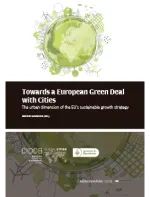The European Green Deal as catalyst for climate justice in cities

While the European Union (EU) has some of the world’s most robust institutions for ensuring the welfare of its citizens, the launch of the European Green Deal (EGD) is an acknowledgment that emerging vulnerabilities from climate change require new approaches to maintaining societal wellbeing. This shifts the EU toward alignment with standardised global goals for keeping planetary warming from exceeding 2oC relative to pre-industrial levels and toward rethinking the European mode of ensuring safe and healthy ways of life for its residents. n the surface, the EGD is largely an economic programme rooted in efforts to shift industry toward a low-carbon economy. However, looking deeper, it points toward a desired transition: does it indicate a possible evolution toward a European welfare state that takes into account climate justice?
The EGD encourages countries to rethink entrenched norms around economic growth with, it is hoped, positive repercussions for social and environmental outcomes. This push toward a green economy has been met with some cynicism (Varoufakis & Adler, 2020), given that analogous efforts to develop a similar agenda at the intersection of economy, environment and society (e.g. sustainability, climate mitigation/adaptation and resilience initiatives) have had mixed results when the essential metrics are considered. Overall greenhouse gas emissions have steadily declined since 1990 within the EU, though some sectors have shown a continual rise (EEA, 2020) and global warming has kept increasing. Meanwhile, in the EU and globally, social inequality has worsened in the time these programmes have been in operation, a trend that has been especially acute in cities (Musterd et al., 2017; Forster et al., 2017).